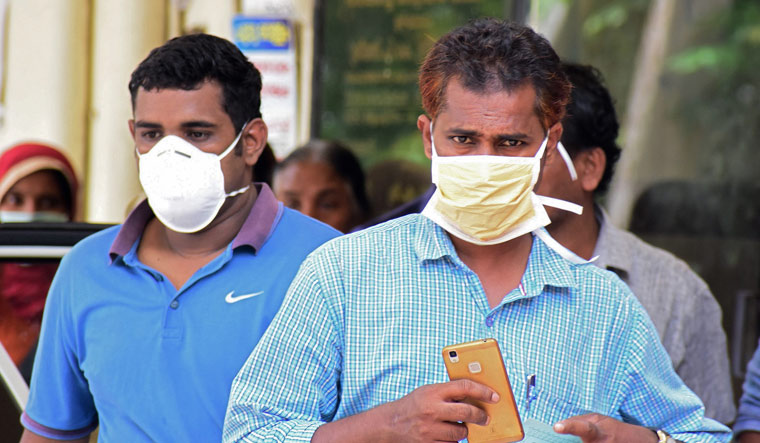With the state government confirming that the 23-year-old youth admitted to a private hospital in Ernakulam has a case of the Nipah virus, Kerala Health Minister K.K. Shailaja has urged all those with Nipah-like symptoms to seek treatment immediately.
Union Health minister Harsh Vardhan confirmed that the Centre was working closely with the Kerala government to handle the situation, and that the 86 people that the youth had come in contact with were being monitored.
Given the tendency for fake news and misinformation to spread during such occurrences, the need of the hour is to take stock of credible communications on the virus, its prevention and treatment.
Nipah: What it is, symptoms and treatment
- What is Nipah?
Nipah is a zoonotic virus — ie one that is transmitted from animals to humans. Nipah can also be transmitted from humans to humans. Symptoms usually present themselves within two weeks of exposure to the virus. Fruit bats (otherwise known as the Indian flying fox or great Indian fruit bat) are the natural hosts of the virus, although pigs have also been observed to be carriers.
- Avoid drinking raw date palm sap, toddy
As fruit bats tend to feed from the clay pots used to collect tree sap as night, it can lead to contamination. Avoid eating raw date palm sap, drinking toddy, and otherwise consuming fallen fruits. Those who handle toddy or fruits need to exercise precautions as well.
Symptoms
Nipah may present asymptomatic or subclinical symptoms according to the World Health Organization. The NCDC says the “hallmark of Nipah infection” is the acute onset of the following symptoms:
- Moderate to high grade fever
- Headache
- Vomiting
- Cough
- Breathlessness
- Change in behaviour/sensorium
- Seizures/abnormal movement
- Myalgia (muscle pain)
- Fatigue
The NCDC’s differential diagnoses, i.e. a watchlist for diseases that present similar symptoms, include conditions like Dengue, Japanese encephalitis, cerebral malaria, scrap typhus, bacterial meningitis, herpes simplex encephalitis, and other viral encephalitis.
Treatment:
There are no current treatments or vaccines for Nipah, with an average case fatality of 74.5 per cent between 2001 and 2012 according to the World Health Organization’s (WHO) South East Asia regional office.
The anti-viral drug Ribavirin has proven effective in in-vitro trials, with the Kerala government recommending it as a life-saving measure in 2018 — but only in proven cases. In an open-label test conducted in Malaysia, the drug resulted in a 36 per cent decline reduction in mortality. Another drug, Remdesivir, which is used to treat Ebola, has proven effective against Nipah in trials conducted on green monkeys.
National Centre for Disease Control guidelines
The National Centre for Disease Control (NCDC) has issued a circular titled “NIPAH Virus Disease- Information for General Public.” It lists the ways that Nipah can spread as well as the people who are most vulnerable to catching it.
Here are the guidelines from the NCDC:
Avoid close contact with Nipah infected people, bats or pigs. Human to human infection can take place from having close contact with a person affected. Those who stay at home with the victims are also vulnerable, but those who provide care in a hospital setting may also be vulnerable if appropriate protective equipment is not used.
Handling of dead bodies of those who died due to the Nipah virus should be done in accordance with the government advisory. Handling Nipah-affected bodies during the cremation and burial is considered highly hazardous.
Extreme care and standing operating procedures laid down by the experts of National Centre for Disease Control (NCDC) were followed for handling Nipah affected bodies during the cremation and burial as exposure to Nipah virus (NiV) is highly hazardous.
Secretion and excretion from a deceased person are considered equally infectious to that of a living infected person. Therefore, as part of the standard procedures, the bodies should not be sprayed, washed or embalmed. The personnel handling it need to wear protective equipment like gloves, gowns, N95 masks, eye protection shield and shoe cover.
During this emotional moment, traditional rituals and practices may need to be modified to prevent the exposure of family members to the disease.
Hygiene is the best practice
Good hygiene is one of the most important factors for avoiding Nipah, according to health experts. Speaking to Rachel V. Thomas from THE WEEK, Divya Menon, a clinical professor from the Amrita Institue of Medical Sciences, suggested playing it safe when travelling to Nipah-affected areas.
"If you are travelling to the infected area, use a general mask. While coughing close your mouth with a handkerchief or cough on your sleeve, wash hands properly, and maintain hygiene," Menon said.
Nipah hotline
For any concerns of questions related to Nipah, the Arogya Jagratha programme of the Directorate of Health, Kerala, has set up a control room whom you can call. The numbers are 1077 and 1056.
Nipah is a zoonotic virus — ie one that is transmitted from animals to humans. Nipah can also be transmitted from humans to humans. Symptoms usually present themselves wit
ALSO READ
- Malappuram Nipah virus case: What Union Health Ministry asked Kerala to do to contain outbreak
- Kerala Nipah virus outbreak latest updates: 214 people named in patient's primary contact list, Anakkayam's commercial establishments to remain shut after 5 pm
- Kerala Nipah outbreak: Malappuram's Pandikkad declared epicentre, minor patient to be shifted to Kozhikode Medical College




.jpg.image.100.58.jpg)





